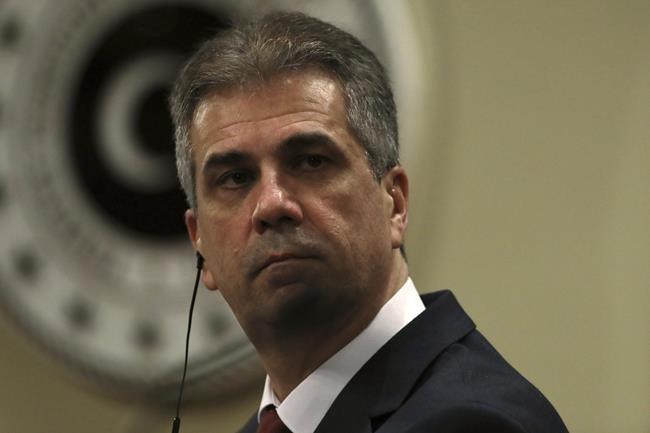
FILE - Israeli Foreign Minister Eli Cohen listens to Turkey's Foreign Minister Mevlut Cavusoglu during a joint press conference after their talks in Ankara, Turkey, Feb. 14, 2023. Cohen arrived in Kyiv on Thursday, FEb. 16, 2023, the first public visit to Ukraine’s capital by a senior Israeli official since Russia’s invasion last year. (AP Photo/Burhan Ozbilici, File)
Republished February 16, 2023 - 10:41 AM
Original Publication Date February 15, 2023 - 11:41 PM
KYIV, Ukraine (AP) — Israel and Ukraine on Thursday agreed to step up cooperation in a shared struggle against Iran, Israel's foreign minister announced, as he wrapped up the first visit to Kyiv by a senior Israeli official since Russia's invasion last year.
But Foreign Minister Eli Cohen gave few details on what type of cooperation would take place. He also gave no indication that Israel had met a longstanding Ukrainian request to join the U.S. and other Western allies in providing weapons to the Ukrainian military.
Israel considers Iran to be its greatest enemy, citing the country's nuclear program, its hostile rhetoric and its support for militant groups along Israel's borders.
With Iran now providing attack drones to Russia in the Ukrainian war, Israel could be in a position to assist Ukraine with intelligence on arms shipments and expertise on how to counter the aerial threats.
Speaking to reporters after a meeting with Ukrainian President Volodomyr Zelenskyy, Cohen was evasive. “We spoke about deepening cooperation with Ukraine against the Iranian threat in the international arena,” he said.
Since the outbreak of the war, Israel has walked a tightrope between assisting Ukraine and avoiding friction with Russia, with which it has strategic regional interests. Unlike other western countries, Israel has not imposed sanctions on Russia or Russian officials or provided Ukraine with weapons.
It has provided humanitarian support to Ukraine, including a field hospital. Cohen said Thursday that Israel would provide $200 million in loan guarantees to build hospitals in Ukraine and reiterated an Israeli pledge to give Ukraine a sophisticated air-defense warning system.
But he gave no specifics on when that system might be delivered, made no mention of Russia and did not publicly respond to Ukrainian appeals for Israeli arms.
“Israel, as stated in the past, stands firmly in solidarity with the people of Ukraine and remains committed to the sovereignty and territorial integrity of Ukraine,” Cohen said.
Ukrainian leaders have talked in the past about some intelligence cooperation with Israel. Cohen refused to answer questions about the topic.
The visit came just before the first anniversary of Russia’s invasion and as Western nations seek to increase aid to the country.
Cohen earlier met with Ukraine’s foreign minister, Dmytro Kuleba, who said on Twitter afterwards that he was “thankful for all of the support that Israel and Israelis have provided over the past year.”
“During our detailed and frank talks, we focused on ways to enhance bilateral relations, increase assistance, and address shared security challenges,” he said.
Yevgen Korniychuk, Ukraine’s ambassador to Israel, said that Israel “again assured us that they will bring the early warning system, but they didn’t say when.”
Cohen was reminded of the hardships endured by Ukrainians when air raid sirens sounded as he entered the country’s Foreign Ministry.
Cohen also made stops at Bucha, where hundreds of people were found dead, some with their hands tied, after a Russian withdrawal last year. Ukrainian officials allege atrocities. Cohen also visited Babi Yar, a ravine in Kyiv where nearly 34,000 Jews were killed within 48 hours in 1941 when the city was under Nazi occupation. The killing was carried out by SS troops along with local collaborators.
Cohen said earlier this year that Prime Minister Benjamin Netanyahu’s new government “will definitely do one thing: publicly, we will talk less” about Russia’s invasion of Ukraine, but would keep providing Ukraine with humanitarian aid. Shortly after taking office, he spoke to Russian Foreign Minister Sergey Lavrov.
Israel maintains good working relations with both warring countries, and has large populations of Russian and Ukrainian immigrants. Israel also relies on security coordination with Russia over neighboring Syria, where Israel has carried out hundreds of airstrikes against Iranian military positions in the past decade.
As other Western nations step up assistance to Ukraine, pressure has built on Israel to share some of its sophisticated military means with Ukraine, including from the U.S.
Secretary of State Antony Blinken said following a meeting with Netanyahu in Jerusalem last month that he had emphasized “the importance of providing support for all of Ukraine’s needs – humanitarian, economic, and security.”
Last year, Israel’s former prime minister, Naftali Bennett, attempted briefly to mediate between the sides, flying to Moscow shortly after Russia’s invasion and meeting with President Vladimir Putin. Bennett said an interview earlier this month that Putin assured him at the time that Russia would not kill Zelenskyy.
News from © The Associated Press, 2023